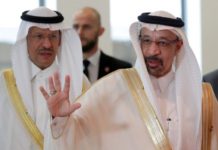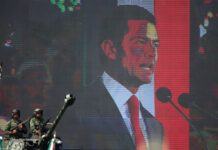From Lima to Havana – a decisive moment for Latin America
Remi Piet
The recent Summit of the Americas and the transition of power in Cuba are just two events among a number of political shifts taking place in Latin America. Do the shifts indicate that the region can prevent another lost decade?
Last week was rich with symbols in Latin America. It started with an eagerly awaited Summit of the Americas in Lima, Peru, and ended with an historical political transition in Cuba, a country now ruled by a leader whose name is not Castro, for the first time in almost sixty years.
Some observers were swift to deny the importance of these events, failing to perceive how both of these events represent an important evolution of political affairs in the Western Hemisphere.
For decades, the region has been ailing from corruption as well as a frontal opposition between a leftist authoritarianism inspired by Fidel Castro and a right-wing nationalism best embodied by Donald Trump since his arrival in office.
On both counts, last week events in Lima and La Havana have offered significant progress and hope for much needed transparency and development on the continent.
The last-minute absence of Donald Trump (who opted to oversee the strike on Syria instead) and also Nicolas Maduro at the Summit of the Americas in Peru had robbed participants of a face-off that would have been in sharp contrast with the historical Obama-Castro hand shake during the latest opus of the Summit in Panama in 2015.
American U-turn on free trade
However, if the US President did not make the trip, the summit remained the opportunity to confirm a key evolution of Washington’s foreign policy in the Americas.
Donald Trump’s populistic protectionism aimed at satisfying the short-term interests of his domestic electorate has put in jeopardy American influence in the region. As a result, China’s influence in the Americas has reached new heights favoured by the Beijing led One Belt One Road initiative.
The Summit of the Americas in Peru was the first step in an attempt to correct this key strategic error. If Trump’s stubbornness towards building an inefficient wall against immigration from Mexico has not vanished yet, his administration has however confirmed the American wish to re-enter the Trans Pacific Partnership.
Last year, Donald Trump slammed the door on a regional trade agreement whose objective was to offset a rise of Chinese economic influence in Latin America and South East Asia. Today he is hoping it is not too late to catch up.
This decision would be good news for Latin American countries in need of financing and foreign investments. With the decrease of commodity and energy prices over the last few years, the perspective of an American disengagement from their economy had further deepened economic crises in particular in Brazil and Colombia.
Instead of drifting to further dependency towards China, Latin America stands to strongly benefit from a competition between the two superpowers for influence in the region.
Reduced impunity for corrupt leaders
In regard to corruption, the Summit participants adopted a “Democratic Governance Against Corruption” pacts which includes 57 action points tackling embezzlement and money laundering.
It would be naive to think that a diplomatic resolution can end the endemic disease which has plagued Latin American institutions for decades. However, one should note that impunity has strongly reduced on the continent with several acting and former presidents suffering the consequences of corruption scandals and judiciary investigations.
Last month, the Peruvian president, Pablo Kuczynski who should have hosted the Summit, stepped down amidst allegations of bribery from construction conglomerate Odebrecht and the buying of congressional votes. Two weeks later, former Brazilian President Lula da Silva spent his first night in jail.
Other notable casualties of the Odebrecht affair have included Ecuador’s suspended Vice President Jorge Glas, sentenced to six years in prison for receiving $13.5 million in bribes, former Guatemalan presidential candidate Manuel Baldizon and Peru’s former President Ollanta Humala.
For many, the fall of Lula is seen as a politically motivated move to prevent a return of the Left at the helm of Brazil. But other political leaders from all sides were also convicted, initiating a much-needed purge in a country where anti-corruption judge Joaquim Barbosa leads the polls for the upcoming presidential elections.
Leftist movements orphaned
Together with those first steps against protectionism and corruption, last week in Latin America was also marked by the political transition in Cuba where Raul Castro stepped down in favor of Miguel Diaz-Canel. If the new Cuban president is very much in line with an ideology that reined over the island for 60 years, this nonetheless remains an important event for the continent. Diaz-Canel is neither a Castro, nor a former military man able to boast victories in revolutionary battles.
Already orphaned of a mentor with the death of Chavez – hardly replaced by the uncharismatic Maduro – Latin American leftist movements are losing their Cuban idols.
With Ortega facing street demonstrations in Nicaragua that could very well topple his regime in the next few months and Morales whose grip on Bolivia is fizzling after twelve years in power, communism in Latin America needs new leaders and the discreet grey-haired Diaz-Canel is unlikely to be the champion of Latin American youth.
This simultaneous decrease of protectionism, corruption and ideological confrontation could represent a winning formula for a sustainable development in Latin America.
These political and economic trends, together with a strengthening of commodity and energy prices, will hopefully prevent another lost decade for the continent and offer new perspectives for a generation of well-educated Latin Americans penalized by weak institutions and a high level of debt.
Disclaimer: The viewpoints expressed by the authors do not necessarily reflect the opinions, viewpoints and editorial policies of TRT World.
We welcome all pitches and submissions to TRT World Opinion – please send them via email, to opinion.editorial@trtworld.com










